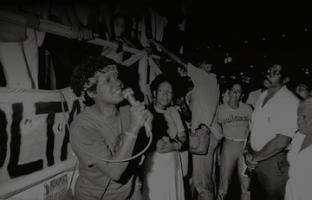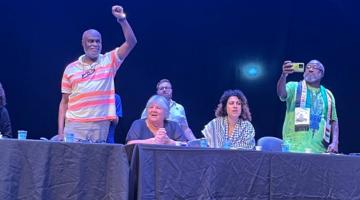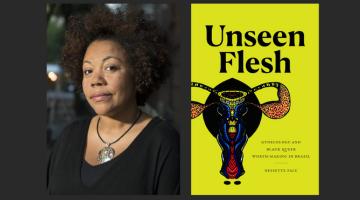In this series, we ask acclaimed authors to answer five questions about their book. This week’s featured author is Reighan Gillam. Gillam is an assistant professor in the Department of Anthropology at the University of Southern California. Her book is Visualizing Black Lives: Ownership and Control in Afro-Brazilian Media.
Roberto Sirvent: How can your book help BAR readers understand the current political and social climate?
Reighan Gillam: Visualizing Black Lives argues that Afro-Brazilians foment antiracism through their own media production. I analyze media such as short films, television programs, illustrations, and Youtube videos made by Afro-Brazilians. The current political and social climate in Brazil is rife with antiblack racism, but also filled with individual and collective resistance. Brazil is said to house the largest population of people of African descent in the world, yet the mainstream media showed few Black characters and protagonists when I conducted research. Outside of the mainstream, Afro-Brazilians have forged critical sites of representation that present lively and complex renderings of Black life. My book helps us to understand how Black media producers and their programs act as important sites for Afro-Brazilians to resist racism and affirm blackness. By producing their own media I argue that Afro-Brazilians insist on the right to create media, attribute meaning to their own identities, and represent racism as they live and experience it. Media is also a site where Afro-Brazilians define Black identities in the face of discourses that would otherwise erase them.
What do you hope activists and community organizers will take away from reading your book?
I came to the study of racial dynamics and Black experiences in Brazil through an interest in studying social movements and activism. That media producers can channel the aims, sentiments, and demands of activists and community organizers is a key takeaway from this book. The strategies that Afro-Brazilians have used to produce their own media and challenge mainstream media are a source of insight and inspiration. Since the late 1970s the Black Movement (Movimento Negro) in Brazil has publicly called for acknowledging the existence of racism and the inclusion of Afro-Brazilians in every facet of Brazilian life. In the book I trace the trajectory of Black activism and its relationship to media production to show how the two are linked. Additionally, I argue that Black activism laid the foundation upon which media producers build their images, narratives, and representations that foment antiracism. Strategies Afro-Brazilians have used to challenge mainstream media include lawsuits. For example, Geledés, an Afro-Brazilian women’s organization sued TV Globo for its harmful representations of Afro-Brazilians. In response, TV Globo aired an episode that sought to repair the harm. These kinds of interventions by Black organizations monitor the mainstream media and hold them accountable for the meanings they communicate about Black people. This is one strategy among many that Afro-Brazilians use to intervene in the mass media.
We know readers will learn a lot from your book, but what do you hope readers will un-learn? In other words, is there a particular ideology you’re hoping to dismantle?
Visualizing Black Lives participates in the ongoing struggle to dismantle the belief that Brazil is a country of racial mixture and thus free from racial discrimination and racism. Brazilian nationalism has centered the belief that the population is a mixture of African, Portuguese, and Indigenous heritage and that the absence of a color line prevents the practice of racism. Yet, racism does exist and is evidenced by the treatment of the country’s African descendant population. Brazil is said to have the largest population of African descent outside of Africa and my book delineates how they define themselves and the meanings they attribute to blackness through media production in São Paulo. By depicting the realities of everyday and structural racism this media counters the pervasive belief of a racially harmonious Brazil.
This book also calls for media producers to unlearn the practices and habits that have produced stereotypical and simple depictions of Black people. Afro-Brazilian media producers take great care and put much thought into the kinds of stories they tell about Black life, history, and culture. They mine the contours of their own and others’ experiences and shape these into television episodes, short films, and illustrations. This media demonstrates that Black characters can be represented in complex ways that do not replicate the harm of stereotypes and controlling images.
Which intellectuals and/or intellectual movements most inspire your work?
I am inspired by the tradition of intellectuals who have sought to understand how Black people live in and survive in antiblack societies. Intellectuals who have contributed to this project in Brazil include Carolina Maria de Jesus, Abdias do Nascimento, and Lélia Gonzalez. Carolina Maria de Jesus wrote books, including Quarto de Despejo (Child of the Dark: The Diary of Carolina Maria de Jesus), which illuminates her experience as a Black woman living in a favela and working as a trash picker. Abdias do Nascimento was a politician, artist, and writer who has been a leader in the Black Movement and called for the rights and recognition of Black people in Brazil. Lélia Gonzalez, a professor and researcher, was a founding activist in the Black movement and her writings theorized the conditions that thwarted Black people, such as Lugar de Negro (the place of Black people). This intellectual work runs against the grain of Brazilian nationalism, which has traditionally denied the presence of racism. This work has contributed to the creation of contemporary policies of affirmative action and law 10.639, which requires the teaching of Black history and culture in Brazil. Afro-Brazilian media producers with whom I interacted and included in my book continue this work in the area of representation and image creation.
Which two books published in the last five years would you recommend to BAR readers? How do you envision engaging these titles in your future work?
This is not a book, but I recommend the film Temporada (2018) or Long Way Home by André Novais Oliveira. It is a Brazilian film but can be found on Amazon. The film is set in a small town outside of the city of Belo Horizante and it follows the inner journey of a Black woman, Juliana, who moved there after experiencing a traumatic experience. She attempts to move on with her life, make new friends and learn a new job in a new city. Temporada depicts quotidian life in this town and includes a predominately Black cast of actors and actresses. The director, André Novais Oliveira, is an Afro-Brazilian man who established a production company along with three other men called Filmes de Plástico or Plastic films. This is important because the numbers of Afro-Brazilians who have access to the means of making and distributing a feature length film are still low.
The series Afronta! (Face It!) by Juliana Vicente features a series of short video episodes that depict Afro-Brazilian cultural producers discussing their lives and work. This series can be found on Netflix. Vicente shows actresses, singers, artists, politicians, and filmmakers discussing their influences, experiences, and creative endeavors. The first-person narratives of creative workers flesh out these individuals in ways that are not often seen or heard in Brazil. Juliana Vicente is a Black woman filmmaker who established her own production company called Preta Portê films, which produces media about topics that are otherwise marginalized in mainstream media.
I engage both Afronta! and Temporada in forthcoming essays about Afro-Brazilian media production. In one essay I focus on the thought that went into building a Black woman character in Temporada and in another essay I examine how the Afronta! series opens a space from which Black women cultural producers can speak thus conferring visibility onto a group that has been marginalized.
Roberto Sirvent is editor of the Black Agenda Report Book Forum.



















